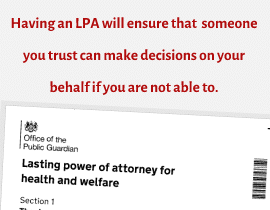My partner and I are not married, what happens if I die?

The short answer to this is that if you are not married or in a civil partnership, your partner will not automatically benefit from your estate unless they are specifically named in your Will.
Many people are under the misconception that their partner will inherit as might a married couple if they do not have a Will (although that has major complications as well)
Terms such as common law husband or common law wife are often used, but these do not hold any legal standing, and will not be applicable for your partner to automatically inherit anything from you should you die without a Will
Under the law, if you die without a Will, you will be declared as dying “intestate”. Under intestacy rules there is a specific order of priority for relatives to inherit (note, “partners” is not included here) So should you die, these are the people who will benefit instead of your partner:
- Any children you might have
- Your parents
- Brothers and sisters
- Half brothers and half sisters
- Grandparents
- Aunts and uncles
- Children of aunts and uncles (cousins)
The Government website has a great tool to see who would inherit if someone dies intestate, it could be a very distant relative. You can see this here.
What in reality could this mean for your partner if you die without a Will?
Even if you operate a joint bank account, your partner may not immediately inherit the balance and, therefore have access to it.
If your partner lives in your house, and does not share the ownership, they can be asked to leave by your beneficiaries.
If the property you live in together is owned jointly, it is likely your partner will become sole owner, but will not benefit from the support of your savings or possibly life assurance to help shoulder the burden. There is even more of a threat if you are registered as Tenants in Common for the property if you don’t have a Will.
Your possessions that can mean so much to your partner would go to your beneficiaries.
Pensions and life assurance policies will not automatically benefit your partner. But note, depending on your schemes in some pensions, life assurance and other similar policies you can stipulate who you would like to benefit, but this is usually discretionary.
There is the possibility that you partner could make a claim on your estate and make a deed of variation, but this is only likely to happen if all the those set to inherit agree to hand back their inheritance to your partner. This can also become a lot more complicated if the beneficiaries are under 18 as the rearrangement of the estate will require court approval.
If there are issues and disagreements it is highly likely that lawyers will be required by all parties adding a further and significant level of cost and stress.
And then finally if that all goes well, and your partner does then inherit from you, they will then not benefit from Inheritance Tax planning that can happen within a Will and other estate planning.
The bottom line. You should get a Will in place to ensure that your partner is looked after you have gone – and vice versa!
Contact us today for a free and no obligation consultation for all your Will and Estate Planning needs.
Relevant links:




